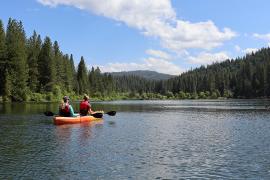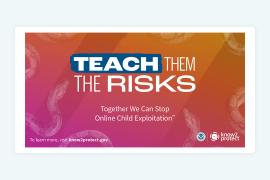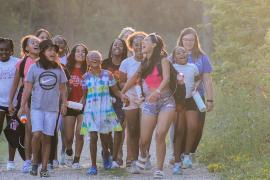A few years back I conducted a study with kids who had gone to summer camp for at least six or seven years. I asked them to talk about their camp experiences, and from their stories identified convincing evidence that summer camp is an important place for kids to learn and grow. Recently, the skills campers in my study attributed to their camp experiences — confidence, leadership, social skills, independence, self-direction — have been described in books and articles as important noncognitive factors essential for success in the “new economy.” If camp’s purpose is to give kids a world of good, then camp seems a likely place for young people and adults to acquire and practice these important skills so they can imagine ways they might adapt to the challenges in an ever-changing world.
William Poundstone’s “Are you smart enough to work at Google?” describes the “new economy” in the context of the Google corporation’s decision to shift hiring techniques from screening job candidates “beyond learning particular sets of skills, toward measuring the ability to innovate and problem solve.” He provides several intriguing examples illustrating how the new Google interview questions emphasize intelligence as more than what is learned in school and rather the “ability to reason well and grasp the subtleties of the world around us.”
Industry and economics have historically driven the educational reforms necessary to prepare kids for the workforce. Schools often lag behind, and while gaining this type of insight would enable educators to teach students how to learn, as well as what to learn, enabling students to take more ownership and control over their own learning, camps, on the other hand, have long been leaders in giving semantic parity between cognitive knowledge and youth development skills essential for learning.
Paul Tough’s (2012) How Children Succeed calls attention to this tension between “what you know” and “ how you use what you know” by questioning “the cognitive hypothesis,” or the belief “that success today depends primarily on cognitive skills — the kind of intelligence that gets measured on I.Q. tests, including the abilities to recognize letters and words, to calculate, to detect patterns — and that the best way to develop these skills is to practice them as much as possible, beginning as early as possible.” In his latest book, Tough sets out to replace this assumption by emphasizing the notion that noncognitive skills are more crucial than sheer brain power to achieving success, including:
- persistence
- self-control
- curiosity
- conscientiousness
- self-confidence
Camp professionals are likely familiar with the benefits included in Tough’s list of factors. In fact, ACA has conducted important studies with conclusions aligning closely with this list of noncognitive factors — 3,395 families whose child attended one of eighty different day or resident summer camps measured growth from precamp to postcamp surveys in four domains:
- positive identity
- social skills
- physical and thinking skills
- and positive values
Sound familiar? To anyone living in the world of summer camp, the skills necessary in the new economy sound a lot like old habit. For over 150 years, camps have provided landscapes of learning for generations of campers the old-fashioned way by giving kids the space to practice what they learn in school and opportunities to explore ways of making sense of what they know in new and different settings outside the classroom.
In fact, despite classrooms having the connotation in society for being exclusive places for learning, schools often don’t do enough to prepare young people for the new economy’s demands. In his newest publication, educator David Conley at the Educational Policy Improvement Center suggests, “most students don’t get enough opportunities to practice an array of learning strategies as they go through school.” One reason, as Conley suggests, is that “developing strategic learning techniques takes time and practice.” On the other hand, camp preserves for kids the chance to slow down, to notice, to attend, to engage and interact with their world. A camp curriculum, unlike most school curricula, awakens kids with challenging activities that encourage innovation and exploration, the same kind of innovation that creates jobs, and the kind of exploration through which discoveries are made.
In a recent opinion published in the widely read Education Week, Conley (2013) calls for the unfortunately named noncognitive factors to be renamed. Claiming the name suggests “not-thinking,” he suggests the term “metacognitive factors,” as he rhetorically asks “are we not observing a higher form of thinking when we see students persist with difficult tasks, such as overcoming frustration; setting and achieving goals; seeking help; working with others; and developing, managing, and perceiving their sense of self-efficacy?”
In my own study, the stories told to me by kids who attended summer camp described examples of Conley’s argument, including metacognitive processes like:
- “exposed me to new ideas”
- “inspiration to move on”
- “learning new things”
- “being okay with myself”
- “practicing role modeling”
- “learning how to talk to others”
- “becoming oneself”
- “avoiding peer pressure”
Even as research tells us camp helps kids learn in ways that will improve their school performance, why do we still have such a hard time convincing folks that camps are perhaps better suited to provide kids with the kinds of experiences learners need, and that camp is more likely to grow citizens with the twenty-first century learning characteristics our world demands? In the face of shifting economic and educational landscapes, how do summer camps keep open to the need for developing meta/noncognitive factors even as we have regard for tradition? How might the next 150 years of camp continue to prepare kids for the world’s demands?
Just this last year, ACA convened a task force to examine the link between the research on meta/noncognitive factors and the ways camps develop these skills each summer in millions of young people and adults. And each of us must do our part — it’s important to help educate campers and parents about the important learning benefits of the camp experience. By simply getting better at what they already do, camps are well positioned to be an important element on the educational spectrum necessary to succeed in this century and beyond — or as Dr. Edmund Gordon of Yale and Columbia Universities calls the “supplementary education” necessary for high academic achievement in school and life in this new economy.
If we expect the next generation of young people to create a world in which they identify the deficiencies and try and repair them, then summer camps must be recognized broadly as one of the last places for developing the creativity and the curiosity necessary for children to, as Maxine Greene reminds us, “imagine how things should be and how they might be.”
Share this posting and others like it so that American summer camps are seen as credible experts in the work of equipping kids with life skills the old fashioned way, by providing engaging experiences so that young people grow to learn for themselves; camps open young minds to possibilities they may not have seen before; camp is where imagination flourishes — where kids can explore concepts and turn ideas on their head, creating openings into changing how they see the world and how the world can interact with us. As cognitive science, industry, and education reform all hustle to keep up with the times, the future for ACA is now — or as the French like to say, the more things change, the more they stay the same.
Dr. Lance Ozier is the senior literacy specialist at the Institute for Student Achievement, a division of the Educational Testing Service. For fifteen seasons he spent his summers in the Catskill Mountains of New York at Morry’s Camp. Lance now volunteers on ACA’s national Committee for the Advancement of Research and Evaluation (CARE). Contact the author at [email protected].
The views and opinions expressed by contributors are their own and do not necessarily reflect the views of the American Camp Association or ACA employees.




